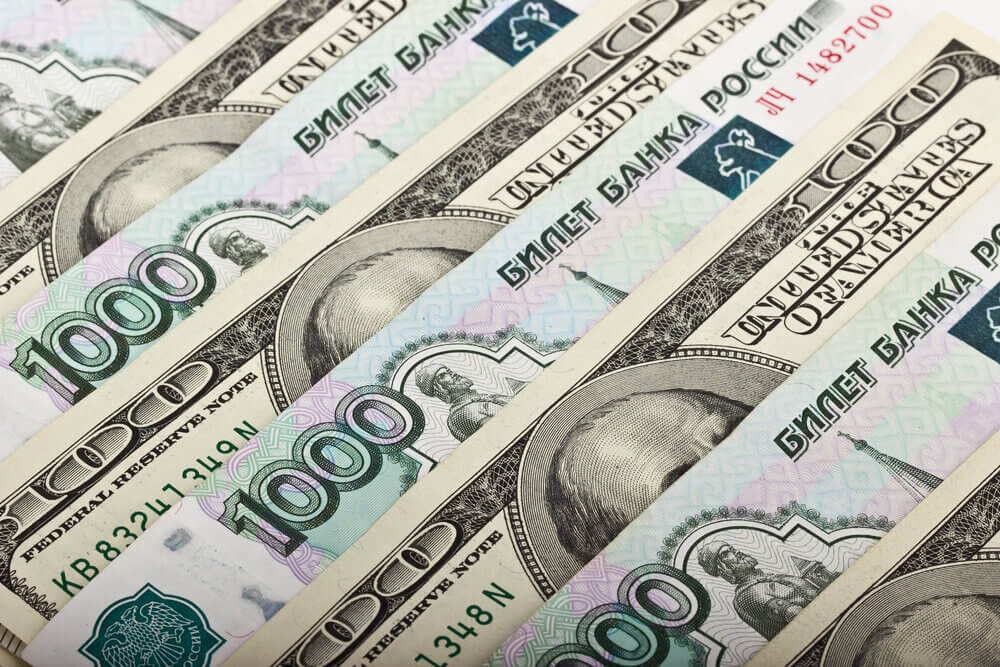
Navigating the Ruble: Inflation and Geopolitical Risks
The Russian ruble’s recent performance against the Euro and US Dollar is worrying financial analysts and leading to various predictions. Uncertainty surrounds the future of the ruble due to geopolitical risks, economic policy changes, and the global financial climate.
The RUB has suffered a notable decline, owing to the escalating geopolitical tensions, along with war on Ukraine internal unrest is growing. The USDRUB pair was observed to trend higher, indicative of the ruble’s fall against the dollar. The unstable world situation affects the RUB and investor feelings, causing more changes in the forex market.
Furthermore, the Russian currency is hovering near a 16-month low, a predicament partly driven by Russia’s high inflation rates. Elvira Nabiullina, the head of Russia’s central bank, has stated that higher rates are necessary to bring inflation to the targeted 4% by 2024. High inflation can weaken a country’s currency, reducing its purchasing power. This can have implications for the EURRUB and USDRUB exchange rates, potentially putting more pressure on the ruble.
However, there have been times when the ruble has strengthened against the dollar, moving away from the 91 mark. The ruble has sometimes strengthened against the dollar, moving away from the 91 mark. This demonstrates the complexity of the foreign exchange market. Like other currencies, the Russian ruble is influenced by various factors, both locally and globally.
The outlook, however, remains uncertain, with the future of the RUB hinging on a multitude of factors. The resolve with which the Russian Central Bank tackles inflation will be a critical determinant. If the central bank successfully institutes higher rates and curbs inflation, the ruble may find some much-needed support.
War Killing the Ruble
Geopolitical developments also hold the key to the ruble’s future trajectory. A de-escalation of geopolitical risks could restore investor confidence and stabilize the ruble. However, any exacerbation of the external and internal tensions might lead to a further drop in the currency.
Moreover, global economic conditions, particularly those affecting the EUR and the USD, will undoubtedly have a significant impact. The pandemic recovery, ECB and Fed interest rates, and global energy demand can all affect exchange rates.
The Russian aggression in Ukraine has led to heightened geopolitical tensions, which in turn have created an atmosphere of uncertainty in the financial markets. This uncertainty often leads to a flight of foreign investors from perceived riskier assets, including the RUB. Consequently, the demand for the ruble decreases, leading to a depreciation in its value. Additionally, such aggression has triggered numerous international sanctions against Russia, further isolating its economy. The sanctions could undermine Russia’s trade and economic growth, exerting even more downward pressure on the ruble exchange rate. Hence, geopolitical risks can significantly influence currency stability.
Exchange rate – an outlook
The future of the EURRUB and USDRUB exchange rates is uncertain due to high inflation in Russia and geopolitical risks. High inflation is decreasing the value of the ruble, while geopolitical risks are causing caution among investors. If the inflation situation is handled effectively and geopolitical tensions decrease, it could lead to stability in the ruble. High inflation is reducing the value of the ruble, and geopolitical risks are making investors cautious. If the inflation situation is managed well and geopolitical tensions decrease, it could bring stability to the ruble.
If these issues are not managed well and the global economy remains weak, the ruble could be affected negatively. This could make it more difficult for Russia to get foreign investment, which could worsen their economic problems.
The Russian Central Bank’s actions and geopolitical tensions in other countries will impact the future of the ruble. The value of the ruble may change suddenly and significantly. Therefore, investors and stakeholders should closely monitor the situation. They should also be prepared to react to any major currency market changes. The Russian Central Bank’s actions will impact the future of the ruble.
Other countries’ responses to geopolitical tensions will also play a role. The value of the ruble may change suddenly and significantly. Therefore, investors and stakeholders should closely monitor the situation. They should also be prepared to react to any major currency market changes.




